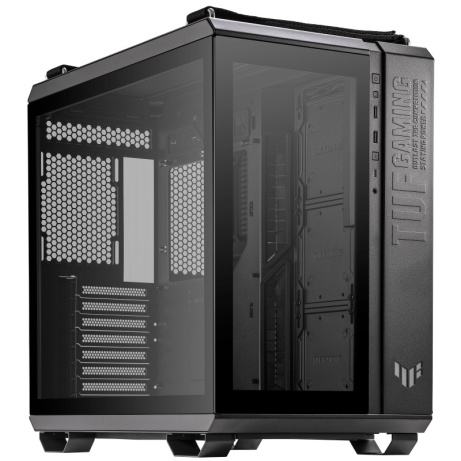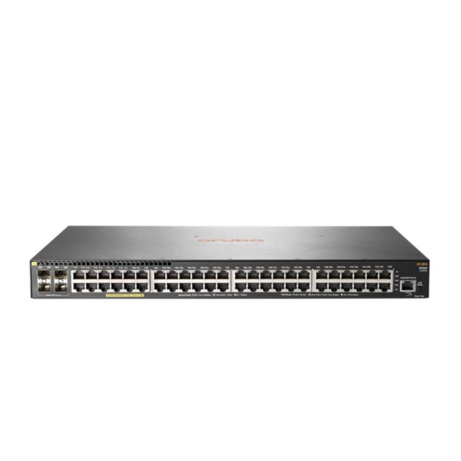 BOHEMIAPC počítačeNačítám kategorie
BOHEMIAPC počítačeNačítám kategorie Notebooky a UltrabookyNačítám kategorie
Notebooky a UltrabookyNačítám kategorie Mobilní telefony a tabletyNačítám kategorie
Mobilní telefony a tabletyNačítám kategorie Chytrá domácnostNačítám kategorie
Chytrá domácnostNačítám kategorie Herní zónaNačítám kategorie
Herní zónaNačítám kategorie- Konfigurátor sestav
Aruba 2930F 48G PoE+ 4SFP
Aruba 2930F 48G PoE+ 4SFP Swch
Řada přepínačů Aruba 2930F je určena pro zákazníky, kteří vytvářejí digitální pracoviště optimalizovaná pro mobilní uživatele s integrovaným a bezdrátovým přístupem. Tyto základní přístupové přepínače 3. vrstvy lze snadno nasadit a spravovat pomocí pokročilých nástrojů pro správu zabezpečení a správu sítě, jako je Aruba ClearPass Policy Manager a Aruba AirWave. Výkonný Aruba ProVision ASIC přináší výkon a podporu nejnovějších aplikací SDN s budoucí programovatelností pro aplikace zítřka. 2930F podporuje 10GbE uplink, PoE +, robustní QoS, RIP Routing, Access OSPF a IPV6 bez nutnosti licencování softwaru.
Řada přepínačů Aruba 2930F nabízí pohodlné a cenově výhodné řešení pro přepínání přístupu, které lze rychle nastavit pomocí funkce Zero Touch Provisioning a vestavěných 10GbE uplinků. Robustní základní sada funkcí vrstvy 3 zahrnuje omezenou záruku na dobu životnosti.
- Management: Fully Managed
- Layer 3 Dynamic: L2 switching / L3 Static routing / RIP routing
- 48x PoE 10/100/1000 RJ45 portů + 4x SFP porty
- Aruba ClearPass Policy Manager and Aruba Airwave
- Doživotní záruka!
- Oprava výměnou následující pracovní den!
- Rozsáhlá síť servisních středisek HP v ČR a na Slovensku
| Aruba 2930F 48G PoE+ 4SFP Switch (JL262A, JL262ACM) 1 | ||
| I/O ports and slots | 48 RJ-45 autosensing 10/100/1000 PoE+ ports (IEEE 802.3 Type 10BASE-T, IEEE 802.3u Type 100BASE-TX, IEEE 802.3ab Type 1000BASE-T, IEEE 802.3at PoE+); Duplex: 10BASE-T/100BASE-TX: half or full; 1000BASE-T: full only | |
| 4 SFP | ||
| Additional ports and slots | 1 dual-personality (RJ-45 or USB micro-B) serial console port | |
| Physical characteristics | Dimensions | 17.42(w) x 11.98(d) x 1.73(h) in (44.25 x 30.42 x 4.39 cm) (1U height) |
| Weight | 9.83 lb (4.46 kg) | |
| Memory and processor | Dual Core ARM Cortex @ 1016 MHz, 1 GB DDR3 SDRAM; Packet buffer size: 12.38 MB 4.5MB Ingress/7.875MB Egress, 4 GB eMMC | |
| Performance | 1000 Mb Latency | < 3.8 µs (64-byte packets) |
| Throughput | up to 77.4 Mpps | |
| Switching capacity | 104 Gbps | |
| Routing table size | 2,000 IPv4, 1,000 IPv6 in hardware, 200 OSPF, 256 Static, 10,000 RIP | |
| MAC address table size | 32768 entries | |
| Environment | Operating temperature | 32°F to 113°F (0°C to 45°C); up to 5000 Feet, - 0C to 40C (32F to 104F) up to 10000 Feet |
| Operating relative humidity | 15% to 95% @ 104°F (40°C), noncondensing | |
| Non-operating/Storage temperature | -40°F to 158°F (-40°C to 70°C); up to 15000 Feet | |
| Non-operating/Storage temperature | 15% to 95% @ 149°F (65°C) | |
| Acoustic | Power: 55.7 dB, Pressure: 41.7 dB | |
| Airflow direction | Side-to-side | |
| Electrical characteristics | Power efficiency certifications | 80plus.org certification: Silver |
| Maximum heat dissipation | 293.0 BTU/hr (309.1 kJ/hr) | |
| Voltage | 100 - 127 / 200 - 240 VAC, rated | |
| Current | 5.1/2.5 A | |
| Maximum power rating | 459 W | |
| Idle power | 48.6 W | |
| PoE power | 370 W PoE+ | |
| Frequency | 50/60 Hz | |
| Notes: Idle power is the actual power consumption of the device with no ports connected. Maximum power rating and maximum heat dissipation are the worst-case theoretical maximum numbers provided for planning the infrastructure with fully loaded PoE (if equipped), 100% traffic, all ports plugged in, and all modules populated. | ||
| Safety | UL 60950-1, 2nd Edition; UL 62368-1: 2nd Edition; EN 60950-1:2006 +A11:2009 +A1:2010 +A12:2011+A2:2013; IEC 60950-1:2005 +A1:2009 +A2:2013; EN 62368-1: 2nd Edition; CSA 22.2 No. 60950-1-07 2nd; IEC-62368-1: 2nd Edition; EN 60825-1:2014 / IEC 60825-1:2014 Class 1 | |
| Emissions | EN 55032:2012/CISPR 32 Class A; FCC CFR 47 Part 15 Class A; VCCI Class A; ICES-003 Class A; CNS 13438 | |
| Immunity | Generic | EN 55024:2010/CISPR 24 |
| ESD | IEC 61000-4-2 | |
| Radiated | IEC 61000-4-3 | |
| EFT/Burst | IEC 61000-4-4 | |
| Surge | IEC 61000-4-5 | |
| Conducted | IEC 61000-4-6 | |
| Power frequency magnetic field | IEC 61000-4-8 | |
| Immunity | Voltage dips and interruptions | IEC 61000-4-11 |
| Harmonics | IEC/EN 61000-3-2 | |
| Flicker | IEC/EN 61000-3-3 | |
| Management | Aruba Central; Aruba AirWave Network Management; IMC - Intelligent Management Center; Command-line interface; Web browser; Configuration menu; SNMP manager; Telnet; RMON1; FTP | |
| Services | Refer to the Hewlett Packard Enterprise website at http://www.hpe.com/networking/services for details on the service-level descriptions and product numbers. For details about services and response times in your area, please contact your local Hewlett Packard Enterprise sales office. | |
Key Features
- Aruba Layer 3 switch series with VSF stacking, static, RIP and Access OSPF Routing, dynamic segmentation, ACLs, and robust QoS
- Supports cloud and on-premises management. And advanced policy management using Aruba ClearPass
- Convenient built-in 1GbE or 10GbE uplinks and up to 740 W PoE+
- Software-defined ready with REST APIs and OpenFlow support
- Simple deployment with Zero Touch Provisioning
The Aruba 2930F Switch Series is designed for customers creating smart digital workplaces that are optimized for mobile users with an integrated wired and wireless approach. These convenient Layer 3 network switches include built-in uplinks and PoE power, and are simple to deploy and manage with advanced security and network management tools like Aruba ClearPass Policy Manager, Aruba AirWave and cloud-based Aruba Central.
A powerful Aruba ProVision ASIC delivers performance, robust feature support and value with programmability for the latest applications. Stacking with Virtual Switching Framework (VSF) provides simplicity and scalability. The 2930F supports built-in 1GbE or 10GbE uplinks, PoE+, Access OSPF routing, Dynamic Segmentation, robust QoS, RIP routing, and IPv6 with no software licensing required.
The Aruba 2930F Switch Series provides a convenient and cost-effective access switch solution that can be quickly set up with Zero Touch Provisioning. The robust basic Layer 3 feature set includes a limited lifetime warranty.
Standard Features
| Enhanced Capabilities |
| Unified Wired and Wireless Support
Aruba ClearPass Policy Manager
automatically configures switch for different settings such as VLAN, CoS, PoE max power, and PoE priority when an Aruba access point is detected.
defines a set of switch-based policies in areas such as security, authentication, and QoS. A user role can be assigned to a group of users or devices, using switch-based local user role or download from ClearPass
automatically enforces user, device and application-aware policies on Aruba wired and wireless networks. Automated device profiling, role-based access control, and Layer 7 firewall features deliver enhanced visibility and performance for a better overall experience for both IT and end users alike.
provides a secured tunnel to transport network traffic on a per-port or per-user-role basis to an Aruba Controller. In per-user-role Tunneled Node, users are authenticated with ClearPass Policy Manager which can direct the traffic to be tunneled to Aruba controller or switch locally
allows ClearPass to do accounting for clients with static IP address |
| Software-defined networks
Supports multiple programmatic interfaces, including REST APIs and Openflow 1.0 and 1.3, to enable automation of network operations, monitoring, and troubleshooting. |
| Quality of Service (QoS)
for classification into eight priority levels mapped to eight queues
based on TCP/UDP port numbers
sets the IEEE 802.1p priority tag based on IP address, IP Type of Service (ToS), Layer 3 protocol, TCP/UDP port number, source port, and DiffServ
sets per-port ingress enforced maximums and per-port, per-queue minimums
provide graceful congestion management
throttles unicast packets with unknown destination addresses and limits flooding on the VLAN |
| Connectivity
available on select models
provides automatic adjustments for straight-through or crossover cables on all 10/100 and 10/100/1000 ports
12x 1Gbps Ethernet PoE+ ports and four built-in uplinks (2x SFP+ and 2x 1GBASE-T). Built-in power supply.
provides up to 30 W per port that allows support of the latest PoE+-capable devices such as IP phones, wireless access points, and security cameras, as well as any IEEE 802.3af-compliant end device; eliminates the cost of additional electrical cabling and circuits that would otherwise be necessary in IP phone and WLAN deployments
|
| IPv6
|
| Performance and efficiency
- 80 PLUS Silver Certified power supply increases power efficiency and savings - Energy-efficient Ethernet (EEE) support reduces power consumption in accordance with IEEE 802.3az
providing very low latency, increased packet buffering, and adaptive power consumption
allows for increased performance by selecting the number of queues and associated memory buffering that best meet the requirements of the network applications
- Virtual Switching Framework (VSF) front plane stacking creates one virtual resilient switch from up to eight switches. Notes: Requires ArubaOS-Switch 16.06 software. - Ring topology supports up to an 8-member stack - Virtualized switching provides simplified management as the switches act as a single chassis when stacked |
| Convergence
automatically prevent flooding of IP multicast traffic
defines a standard extension of LLDP that stores values for parameters such as QoS and VLAN to configure automatically network devices such as IP phones
facilitates easy mapping using network management applications with LLDP automated device discovery protocol
support multiple methods (automatic, IEEE 802.3at dynamic, LLDP-MED fine grain, IEEE 802.3af device class, or user-specified) to allocate and manage PoE/PoE+ power for more efficient energy savings
assigns attributes such as VLAN and QoS using a locally configured profile that can be a list of MAC prefixes
includes PIM Sparse and Dense modes to route IP multicast traffic (limited to 16 interfaces)
supports one-to-many and many-to-many media casting use cases such as IPTV over IPv6 networks |
| Monitor and diagnostics
allows detailed monitoring of the transceiver settings and parameters |
| Resiliency and high availability
provides high link availability by allowing multiple spanning trees; provides legacy support for IEEE 802.1d and IEEE 802.1w
allows groups of two routers to dynamically back each other up to create highly available routed environments for IPv4 and IPv6 networks (limited to 128 VRs)
support up to 60 static or dynamic trunks with each trunk having up to eight links (ports) per static trunk
provides easy-to-configure link redundancy of active and standby links
provide complete support of SNMP; provide full support of industry-standard Management Information Base (MIB) plus private extensions; SNMPv3 supports increased security using encryption |
| Simplified configuration and management
cloud based management platform offers simple, secure, and cost effective way to manage switches
simplifies installation of the switch infrastructure using Aruba Activate or a DHCP-based process with AirWave and Central Network Management
provides configuration automation for campus networks
supports both cloud-based Central and on-premises AirWave with the same hardware, ensuring management platform changes without ripping and replacing switching infrastructure |
| Manageability
provides independent primary and secondary operating system files for backup while upgrading
allow assignment of descriptive names to ports
finds and fixes common network problems automatically, then informs administrator
stored to a flash image
provide advanced monitoring and reporting capabilities for statistics, history, alarms, and events
ingress and egress port monitoring enable more efficient network problem solving
monitors the link between two switches and blocks the ports on both ends of the link if the link goes down at any point between the two devices
monitor quality of voice traffic using the UDP jitter and UDP jitter for VoIP tests |
| Software releases
|
| Layer 3 services
centralizes and reduces the cost of IPv4 address management |
| Layer 2 switching
increases the scalability of an Ethernet network by providing a hierarchical structure; connects multiple LANs on a high-speed campus or metro network
supports IEEE 802.1Q (4094 VLAN IDs) and 2K VLANs simultaneously
improves the performance of large data transfers; supports frame size of up to 9220 bytes
isolate select non-IPv4 protocols automatically into their own VLANs
allows each VLAN to build a separate spanning tree to improve link bandwidth usage; is compatible with PVST+
allows automatic learning and dynamic assignment of VLANs
encapsulation (tunneling) protocol for overlay network that enables a more scalable virtual network deployment |
| Layer 3 routing
provides manually configured routing; includes ECMP capability
facilitate segregation of user data, without adding external hardware
provides RIPv1, RIPv2, and RIPng routing
provides OSPFv2 and OSPFv3 protocols for routing between access and the next layer on the LAN. Only one OSPF area and up to 8 interfaces are supported
uses a classifier to select traffic that can be forwarded based on policy set by the network administrator (limited to 16 next-hop routes) |
| Customer first, customer last support When your network is important to your business, then your business needs the backing of Aruba Support Services. Partner with Aruba product experts to increase your team productivity, keep pace with technology advances, software releases, and obtain break-fix support.
For complete details on Foundation Care and Aruba Pro Care, please visit: https://www.arubanetworks.com/supportservices/ |
| Warranty and support
see http://www.hpe.com/networking/warrantysummary for warranty and support information included with your product purchase. |
| Security
- uses an IEEE 802.1X supplicant on the client in conjunction with a RADIUS server to authenticate in accordance with industry standards - supports Web-based authentication - supports MAC-based authentication
- Multiple IEEE 802.1X users per port provides authentication of multiple devices on a single port; prevents a user from "piggybacking" on another user's IEEE 802.1X authentication - Concurrent IEEE 802.1X, Web, and MAC authentication schemes per port switch port will accept up to 32 sessions of IEEE 802.1X, Web, and MAC authentications
includes a Trusted Platform Module (TPM) for secure hardware-based generation and storage of cryptographic keys that can be used for a variety of authentication purposes
provide IP Layer 3 filtering based on source/destination IP address/subnet and source/destination TCP/UDP port number
allows only specified ports to communicate with each other
eases switch management security administration by using a password authentication server
encrypts all transmitted data for secure remote CLI access over IP networks
encrypts all HTTP traffic, allowing secure access to the browser-based management GUI in the switch
allows access only to specified MAC addresses, which can be learned or specified by the administrator
allows users to use a more secure and reliable mode of communications between switch and radius servers over unsecure networks
prevents particular configured MAC addresses from connecting to the network
allows secure file transfer to and from the switch; protects against unwanted file downloads or unauthorized copying of a switch configuration file
helps secure switch CLI logon by optionally requiring either RADIUS or TACACS+ authentication
displays security policy when users log in to the switch
blocks Bridge Protocol Data Units (BPDUs) on ports that do not require BPDUs, preventing forged BPDU attacks
blocks DHCP packets from unauthorized DHCP servers, preventing denial-of-service attacks
blocks ARP broadcasts from unauthorized hosts, preventing eavesdropping or theft of network data
protects the root bridge from malicious attacks or configuration mistakes
enables implementation of a highly granular and flexible access security policy and VLAN assignment specific to each authenticated network user
Configures broadcast control selectively on heavy traffic port uplinks
provides network security by restricting peer-to-peer communication to prevent a variety of malicious attacks; typically a switch port can only communicate with other ports in the same community and/or an uplink port, regardless of VLAN ID or destination MAC address
simplifies first-time deployment of AAA in brownfield deployments by allowing full network access for failed clients and provides instant connectivity as soon as a client is plugged-in
ensures that important infrastructure devices such as IP phones are allowed network access even in the absence of a RADIUS server
allows non-chatty legacy devices to stay authenticated by pinning client MAC addresses to the port until the clients logoff or get disconnected
enhances the switch PKI infrastructure with a simpler, scalable and more secure method of certificate provisioning, re-enrollment and renewal |
.

